Do you know what is currently the most widely used AI application in enterprises? It’s chatbots, a form of Conversational AI. Employing natural language processing (NLP) and machine learning (ML), this technology facilitates more realistic, human-like interactions. Conversational AI for enterprises goes beyond just reacting to queries. It understands the context, learns from each dialogue, and provides tailored responses.
For enterprises, the impact of this AI type is more far-reaching than basic communication tasks. It enables enhanced client engagement, reduces response times, and generates actionable data-driven insights. The tool is revolutionizing how businesses interact with their consumers allowing firms to increase retention rates.
Moreover, the market for Conversational AI is projected to reach nearly US$14 billion by 2026. It’s a testament to its escalating demand and potential, especially considering the advancements in Generative AI and other Conversational AI technology trends. These innovations are set to drive sales and improve customer service standards.
In the article, we will explore the benefits of Conversational AI for large corporations, including real-world examples from well-known brands. Lastly, we’ll provide a step-by-step guide for its successful implementation, ensuring that enterprises can fully leverage the technology’s potential to drive revenue and growth.
Ready to bring Conversational AI into your enterprise? Begin your journey towards smarter business interactions with our solutions.
GET IN TOUCH
Table of Contents
Evolution of Conversational AI from the Enterprises’ Perspective
The journey of artificial intelligence in the enterprise realm is a narrative of constant evolution and adaptation. Initially, businesses employed basic automated systems, like rule-based chatbots, designed for simple, script-driven tasks. Such early tools could handle essential inquiries but lacked the sophistication to address complex, context-rich conversations. They were programmed with predefined responses, which limited the ability to comprehend and adjust to the nuances of human language.
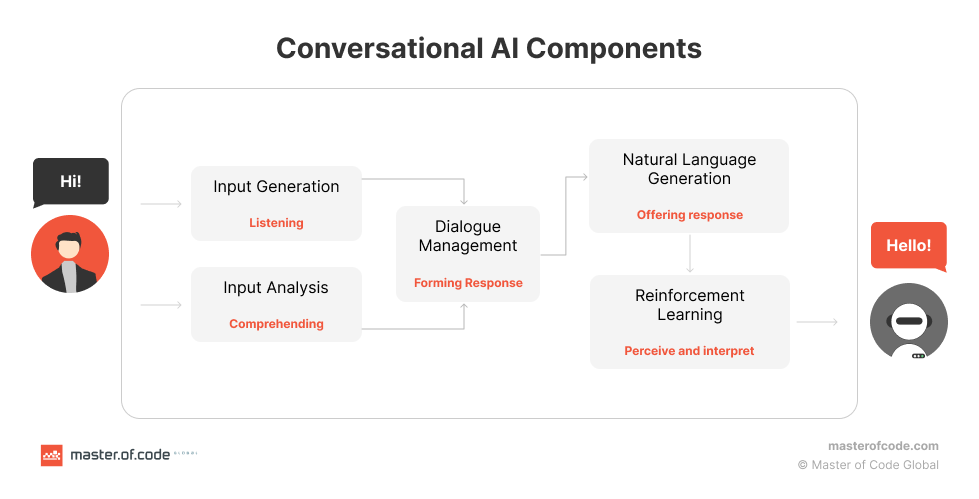
As the needs of enterprises evolved, so too did the demand for more cutting-edge, AI-driven solutions. This shift marked the entry of ML and NLP into the domain of Conversational AI. Unlike the predecessors, these advanced systems are capable of learning from interactions. They understand context and even manage ambiguity in human language. The technologies don’t just follow a prearranged program; they adapt and evolve, offering contextually relevant and personalized conversations.
This progression from rigid, rule-based bots to dynamic, autonomous, and intelligent AI algorithms, reflects the changing landscape of customer engagement and strengthens enterprise-client relationships. Modern technology analyzes sentiment and recognizes speech patterns. It can even anticipate consumer demands, thereby suggesting a more intuitive and satisfying user experience.
This evolution of features and benefits of Conversational AI is not just a technological leap but a strategic transformation. It aligns closely with the evolving objectives of businesses to increase sales and conversion rates as well as improve brand reputation.
What are the Benefits of Conversational AI for Enterprises?
In the landscape of the modern market, artificial intelligence stands as a beacon of innovation, offering a plethora of advantages that transform the way large businesses operate. From automating customer service to providing insightful analytics, this technology is redefining efficiency and client engagement. Here’s a look at the key advantages of Conversational AI that enterprises can reap by integrating artificial intelligence into their operations.
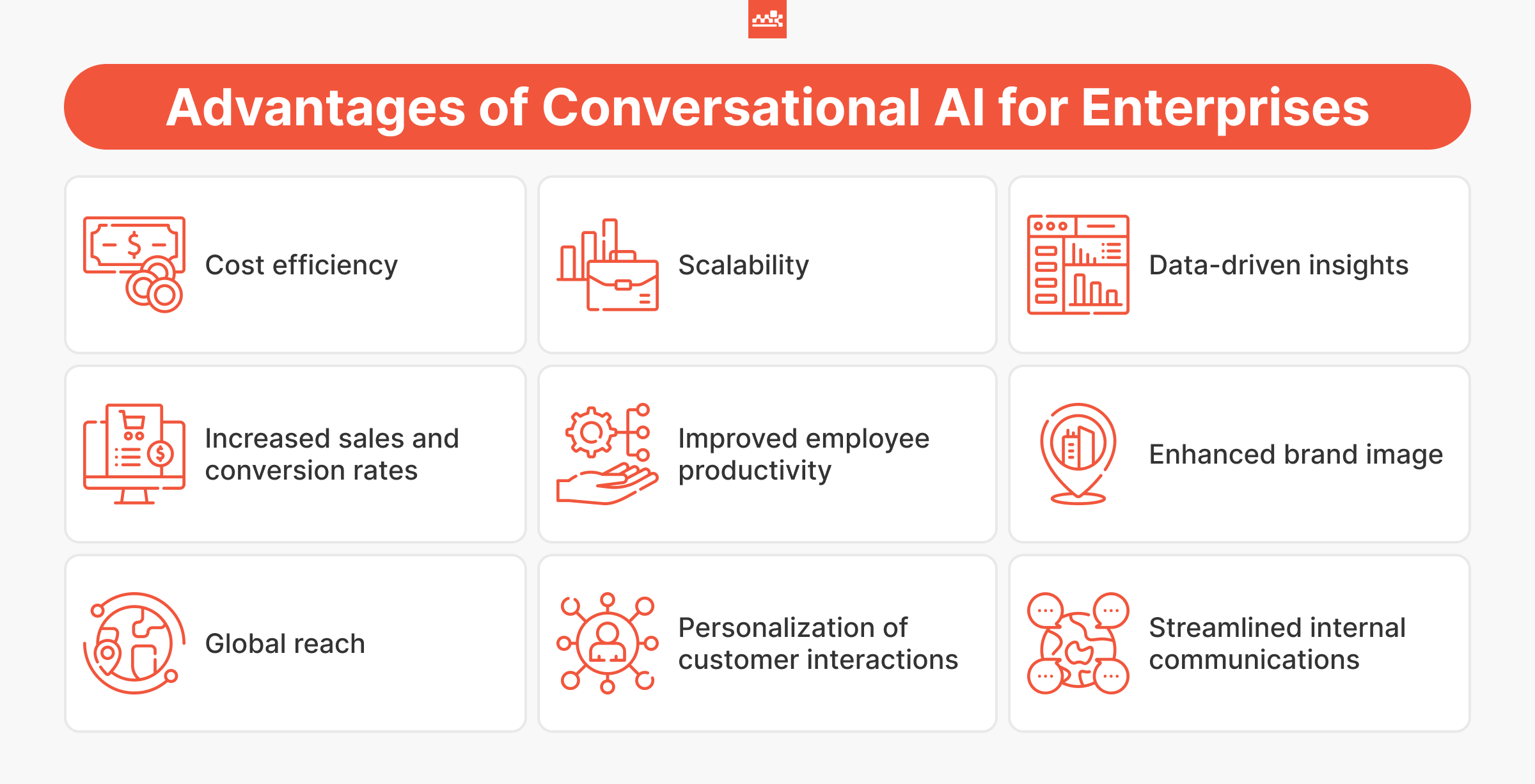
- Cost efficiency. One of the most compelling pros of AI is its significant impact on resource optimization. Companies report an impressive 11.5x greater annual improvement in service costs. This decrease is attributable not only to reduced labor expenses but also to the heightened effectiveness and speed in handling customer inquiries. Such factors contribute to smooth operation with lower overheads.
- Streamlined internal communications. AI-driven solutions facilitate effective team connectivity. They ensure information flows seamlessly across departments, enhancing overall operational efficiency.
- Scalability. AI-powered applications handle a surge in customer queries without the need for additional staffing. This feature is crucial for enterprises, especially considering that interactions handled by conversational agents have soared by up to 250% in various industries.
- Data-driven insights. These systems are adept at collecting and analyzing information. They provide businesses with valuable details that improve sales and marketing strategies. Conversation intelligence facilitates more informed decision-making and strategic planning. Plus, corporations anticipate market trends and consumer preferences, giving them a competitive edge. Finally, companies that use AI to supply agents with real-time guidance experienced a 3.3-fold annual enhancement in client retention rates.
- Global reach. Conversational AI breaks down linguistic and geographical barriers, enabling firms to broaden their international presence. Multilingual capabilities ensure that enterprises can communicate effectively with a diverse customer base.
- Increased sales and conversion rates. Corporations leveraging conversational commerce report a significant rise in the number of deals. The technology’s ability to engage clients and provide relevant information contributes to a 3.5 times greater annual increase in customer satisfaction level, directly influencing revenue generation.
- Enhanced brand image. Seamless, AI-driven interactions enhance the company’s reputation. Personalized and efficient service builds buyer trust and loyalty, leading to reinforced trademark perception, lead generation, and shopper retention.
- Improved employee productivity. By automating routine tasks, the technology frees up agents to focus on higher-value activities. This shift leads to a 2.4 times greater annual increase in staff performance. Additionally, this approach not only diminishes burnout and turnover but also nurtures workers who are both more productive and content.
- Compliance and security. Such systems are designed to meet strict data protection standards, a crucial aspect for safeguarding sensitive information. This commitment to safety protocols is essential in preserving client trust and ensuring the enterprise’s adherence to regulatory requirements.
- Integration with multiple channels. Conversational AI can be integrated across various digital platforms, like Facebook Messenger, WhatsApp, website, etc. Such an approach provides a consistent and unified user journey, regardless of the medium used.
- Personalized customer conversations. This technology intelligently adjusts its responses by analyzing a consumer’s preferences and past exchanges, thereby fostering a more engaging and gratifying experience. Tailored offers significantly boost customer satisfaction.
With Gartner projecting that one in ten agent conversations will be automated by 2026, up from an estimated 1.6% today, the potential for Conversational AI in reshaping enterprise operations is immense. Not only does it reduce interaction times by up to a third compared to human agents, but it also delivers a more customized, efficient service, crucial for buyer retention and business growth.
Real-World Use Cases among Enterprises
Having explored the impressive benefits of artificial intelligence, let’s take a closer look at the use cases and how some leading companies are putting this technology into action and reaping its rewards in the real world.
Hospitality and Travel
Conversational AI in this sector is transforming guest experiences by offering personalized travel recommendations, handling bookings, and delivering instant customer support. For example, hotel chains use chatbots for room reservations, answering FAQs, and providing local travel tips. Airlines employ artificial intelligence to manage check-ins, flight updates, and baggage information.

A notable success story in this sector is the Luxury Escapes Chatbot developed by Master of Code Global. It offered customized trip deals, leading to a 3x higher conversion rate compared to the website. Bot also allowed users to find and book luxury trips easily, with features like ‘Roll the Dice’ for vacation suggestions, contributing to over $300K in revenue within the first 90 days.
Telecommunications
In telecom, AI is utilized for managing client accounts, troubleshooting, and offering plan upgrades. It helps in reducing call center volumes by addressing common queries and can upsell services through personalized recommendations based on user data.
For example, a Telecom Virtual Assistant developed by Master of Code for America’s largest 5G company enhanced customer service. The assistant achieved a significant containment rate of 45% in one-time payment and AutoPay experiences. Furthermore, it engaged in over 1.1 million conversations with users. Thus, Conversational AI in telecom has a wide-reaching impact and the scale of its deployment in customer interactions.
eCommerce and Retail
These sectors leverage the technology for product suggestions, inventory questions, and seamless customer support. AI chatbots can guide consumers through the buying process, provide stock updates, and even handle returns and exchanges efficiently.
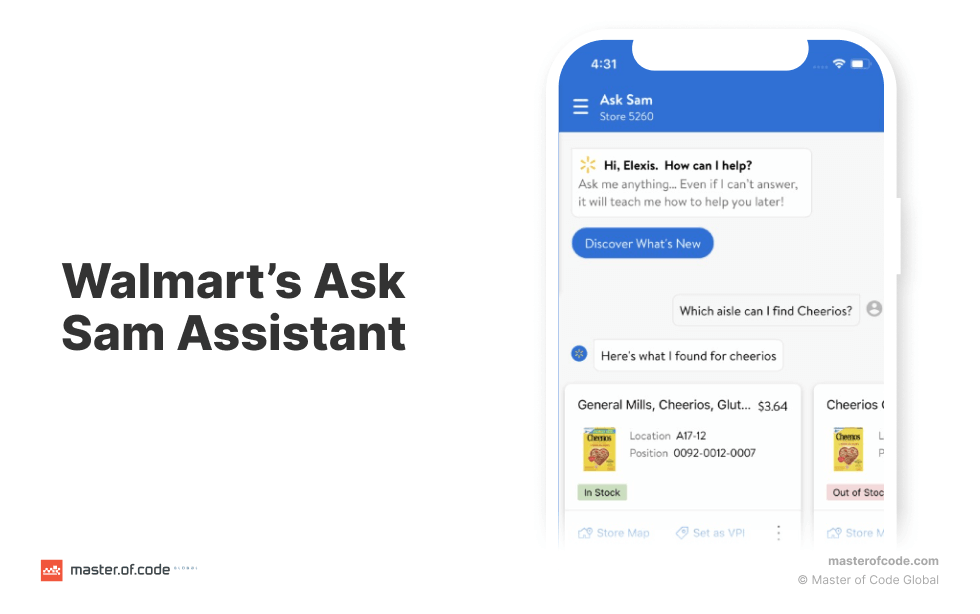
The effective utilization of the technology in real-world commerce is exemplified by Walmart’s implementation of Ask Sam. It assists shop associates with locating items, price checks, and accessing sales information. This tool enhances in-store efficiency, allowing staff to quickly address buyer queries and improve the shopping experience.
Continue reading: More about How to Use Conversational in E-commerce
Banking and Finance
Conversational AI in the financial sector offers aid with account inquiries, transaction processing, and fraud alerts. It can provide advice, help with loan applications, and offer personal investment tips, greatly enhancing client services and operational effectiveness.
In fact, lots of banks are using virtual assistants and chatbots to improve their offerings. For example, Bank of America’s financial aid, Erica, offers a range of management tools such as tracking spending, managing cards, and providing bill reminders. Available through the mobile banking app, Erica also offers support for investment accounts, enhancing users’ banking experience with personalized insights.
Client Care Services
Enterprises are utilizing Conversational AI for customer service to optimize operations, automate responses to routine requests, and intelligently escalate complex issues to human agents. This strategy efficiently resolves common questions while collecting interaction data, helping businesses enhance service quality and reduce employees’ workload.
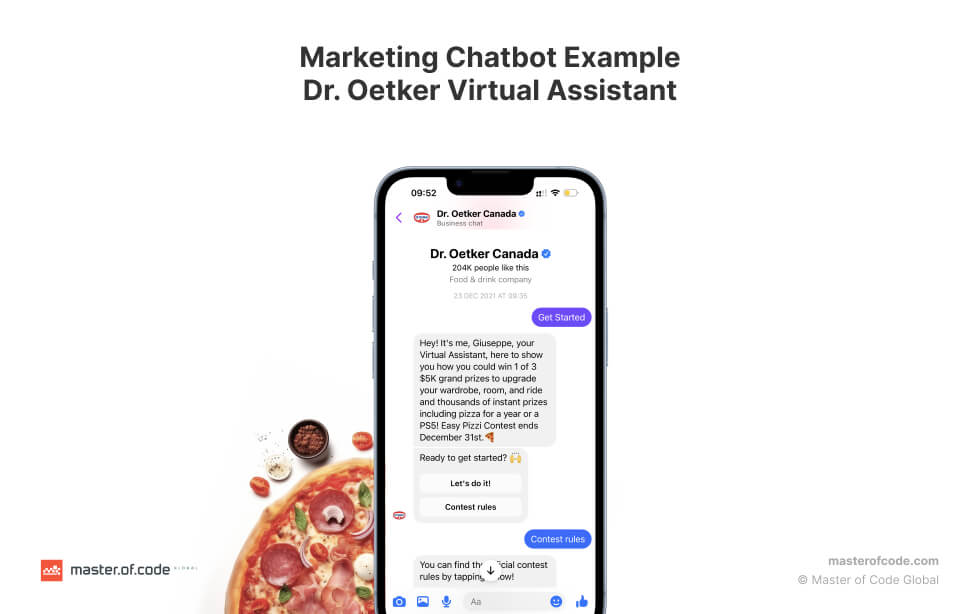
One of the successful AI industry examples is the bot developed by Master of Code Global, Dr. Oetker’s AI-driven assistant. The tool was used to engage users in a game for the Easy Pizzi pizza line. It guided buyers through the registration process and offered interactive features like an AR Instagram filter, boosting engagement and contest entries.
Read also: Can’t find a suitable industry? Explore more use cases and examples applicable to any industry.
Conversational AI Adoption Challenges and Solutions

In addition to the benefits of Conversational AI, enterprises face specific implementation challenges that require targeted interventions:
- Technology compatibility with existing systems. Integrating AI with present infrastructure can be complex due to varying technologies and architectures. Employing middleware guarantees smooth integration while selecting platforms with broad system interoperability minimizes disruption. Customized solutions are also vital for aligning AI functionality with distinct business processes.
- Privacy and security concerns. Ensuring the safety of client profiles involves more than just encryption. It requires a comprehensive approach including regular updates to privacy protocols, training staff on data handling, and conducting frequent security audits. Compliance with evolving protection regulations, like GDPR, ensures quality standards are met.
- Maintaining human-like interactions. Achieving natural dialogues with chatbots or virtual assistants necessitates an ongoing process of refining AI models with diverse and extensive datasets. Incorporating feedback from real users enables continuous improvement. The integration of advanced natural language processing technologies also plays a crucial role in making AI responses more contextually relevant and realistic.
- Scalability issues. Growth capacity is critical for AI solutions to adapt to market shifts. Cloud-based applications offer flexibility, allowing systems to handle increased loads without compromising performance. It’s also important to design tools with future upgrades in mind, considering both technological advancements and business expansion scenarios.
Although these challenges may complicate the process of leveraging AI for your enterprise, you can address them all by partnering with a reliable service provider. At Master of Code Global, we ensure high-quality AI services by integrating solutions seamlessly with your platforms and internal systems for a unified experience. Our conversation design leverages data to address client pain points effectively, enhancing user interaction with intuitive interfaces. We provide robust cloud infrastructure for AI deployment, including expert management in data governance and continuous model retraining. Additionally, our commitment to ongoing improvement, as per consumer feedback, ensures applications continually evolve to meet your needs and enhance ROI.
Implementation Strategies of Conversational AI for Enterprises
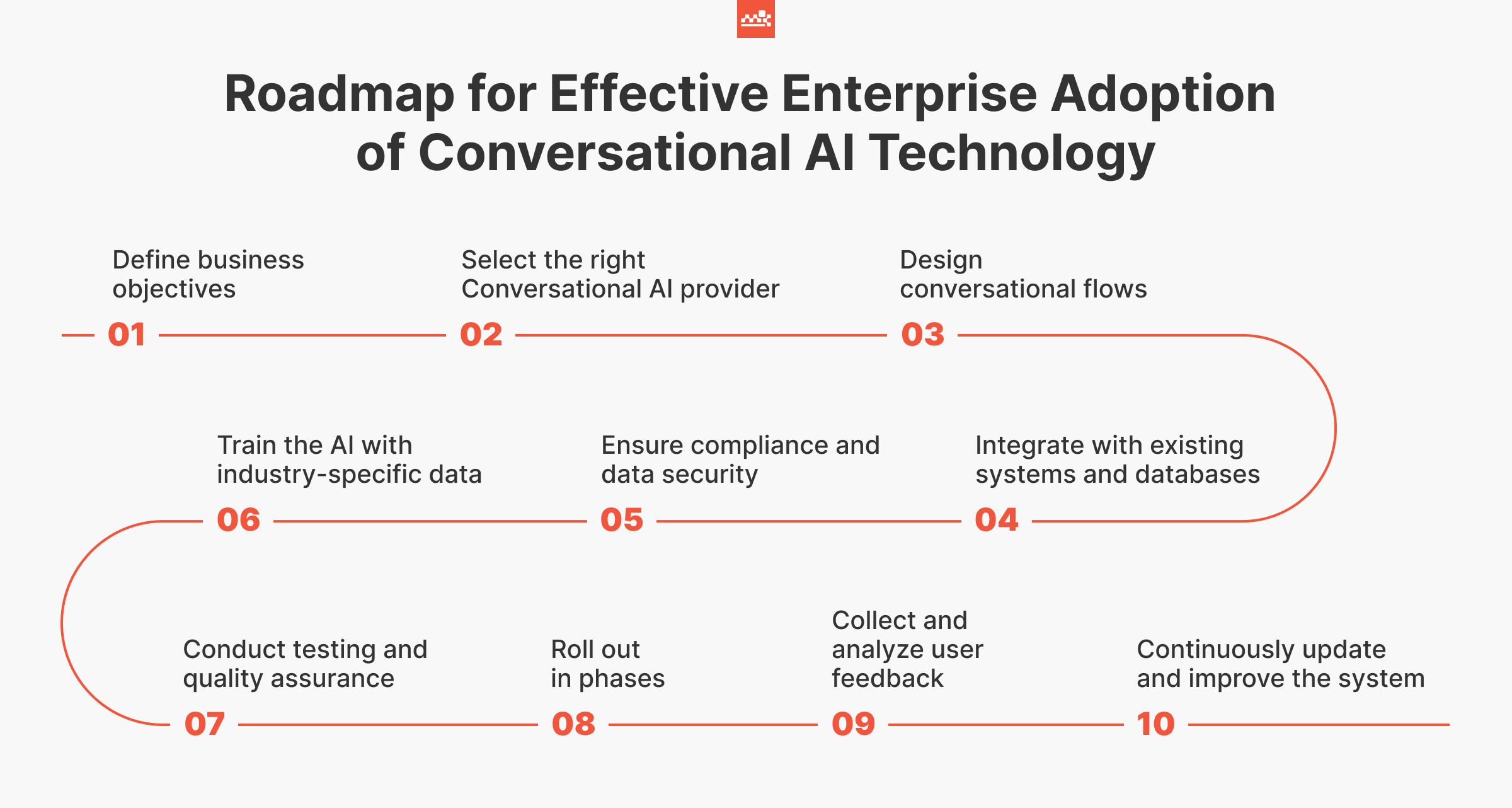
Here is a series of strategic steps crucial for the successful integration of the enterprise Conversational AI technology:
- Define business objectives. At this stage, it’s essential to pinpoint specific goals such as enhancing customer support, boosting sales, or streamlining operations, which will guide the AI system’s development and application.
- Select the right Conversational AI provider. The next step is to choose an IT company whose expertise aligns with your enterprise’s distinct needs, focusing on aspects like scalability, compatibility, and support.
- Design conversational flows. It’s important to develop conversation scripts that mirror typical client interactions, guaranteeing they are user-friendly and address common inquiries effectively.
- Integrate with existing systems and databases. Seamless integration with current infrastructure is paramount for unified processes, ensuring this tool works in tandem with in-place CRM, ERP, and other relevant platforms.
- Ensure compliance and data security. At this point, adherence to information protection laws and the adoption of robust safety protocols are vital to protect sensitive consumer details.
- Train the AI with industry-specific data. Customizing the solution using datasets pertinent to your sector boosts its accuracy and relevance, making it more effective in addressing domain-oriented necessities.
- Conduct testing and quality assurance. Rigorous assessments across various scenarios are essential to ensure the application meets predefined standards and operates flawlessly.
- Roll out in phases. Gradual implementation, starting with a pilot phase, allows for the assessment of effectiveness and necessary adjustments before full-scale deployment.
- Collect and analyze user feedback. Regular insights gathering and analysis are key to understanding consumer experiences and identifying areas for improvement.
- Continuously update and improve the system. Keeping the solution up-to-date with the latest AI advancements and refining it based on ongoing feedback and business needs is crucial for long-term success.
Obviously, it would be challenging to complete all these phases efficiently without a trustworthy and expert tech partner. At Master of Code Global, we specialize in Conversational AI services tailored to each stage of your project. Our expertise in custom chatbot and voice assistant development ensures these solutions integrate seamlessly into your enterprise systems. We focus on creating personalized experiences, utilizing data-driven insights for optimization, and continually fine-tuning according to user feedback. Our services are designed to align with your goals, enhancing both performance and customer satisfaction.
Conclusion
The advancement of Conversational AI is significantly impacting the enterprise sector. It offers numerous benefits like enhanced client engagement, increased sales, and data-driven decision-making. Moreover, AI’s evolution from simple chatbots to advanced solutions illustrates its growing importance in various industries.
All in all, the future of this technology looks promising, with its market projected to grow substantially. As it continues to evolve, we can expect these intelligent systems to become even more integral to operational activities. They will play a crucial role in shaping future business strategies and customer interactions.
We analyze your customer pain points and address them with automation.






